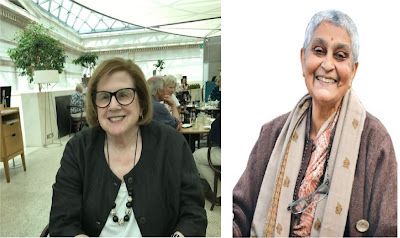Feminism: Elaine Showalter and Gayatri Spivak
Spivak, through her cultural and critical through, tried to challenge the legacy of colonialism. She refused to admit the notion that the Western World is having an upper hand over the Third World as it is more purified from the grossness of acute barbarism. Her critical discourse raises the issues of marginal subjects such as the place of the subaltern women in society and their empowerment. Though the people could surpass the colonial rule, they are not actually free from its influences and power structures.

In the Indian cultural context, the term "subaltern‟ acquires more significance as the people have struggled hard for Indian independence. She prefers the term „subaltern‟ as it encompasses the exact picture of the lower class people. Morton quotes the words of Spivak as I like the word subaltern for one reason. It is totally situational. Subaltern began as a description of a certain rank in the military. The word was under censorship by Gramsci: he called Marxism „monism‟, and was obliged to call the proletarian „subaltern.‟ That word, used under duress, has been transformed into the description of everything that does‟t fall under strict class analysis. I like that because it has no theoretical rigor. India is a land of varieties and vitalities. It is divided into different stages in the
name of class, religion, language, ethnicity, gender, and citizenship. In this scattered outlook, the condition of the subaltern is all the more pathetic. Spivak came to the forefront of a literary circle with her celebrated essay “Can the Subaltern Speak?” The essay vindicates the apprehensions of women in India who practice the widow-sacrifice known as sati pratha . The practice of sati in the pre-independent India was considered as part of a barbaric culture by the Western World.
Feminist criticism today comprehends a diverse field of ideas and interests, disabusing one of the thought that it might represent a unified or single theoretical camp. Indeed, the disunity of feminist criticism is itself a matter for varying opinions, and feminist thinkers have reacted to the problems of internal debate with both enthusiasm and dismay. Some women believe that their political cause is compromised by internal debate because dissent allows men to discuss the importance of feminist literary theory, just as they have dismissed generations of women. Other women see dissent as the sign of a healthy pluralism not permitted to them in the male world and essential to a future of political openness and change. The future of sexual difference, they argue, depends on the recognition of all differences. One tendency, however, does appear to mark much feminist literary criticism. Feminist critics tend to assume that literature is a social institution, although the nature of the institution is still open to debate. What is at stake in feminist writing is not simply literature or criticism as such but the ethical and social consequences of women's exclusion from the world of literature in particular and the world of men in general. The result is a powerful dialogue between life and literature When feminist critics.



No comments:
Post a Comment
if you have any knowledge. please let me know